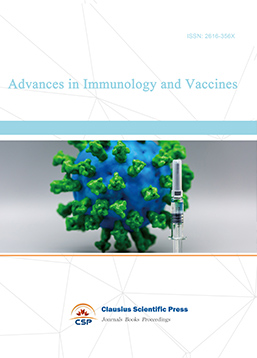Exploration on the Mechanism of the Effect of Icariin on Hepatocellular Carcinoma Based on Network Pharmacology
DOI: 10.23977/tranc.2023.040121 | Downloads: 5 | Views: 206
Author(s)
Liu Yanhua 1, Liu Fanrong 2
Affiliation(s)
1 Shaanxi University of Chinese Medicine, Xianyang, Shaanxi, 712046, China
2 Yulin Hospital of Traditional Chinese Medicine, Yulin, Shaanxi, 719051, China
Corresponding Author
Liu FanrongABSTRACT
Hepatocellular carcinoma is an important cause of human death, Icariin has been found to have anti-tumor effects, which have been demonstrated in a variety of oncology experiments. In order to explore the mechanism of Icariin's action on hepatocellular carcinoma, we have analyzed it by using several platforms. Finally, we obtained six targets, which are TNF, PRKCE, PRKCD, IL1B, NFKB1, and PTGS2. Among them, TNF is the key target of Icariin to inhibit hepatocellular carcinoma. Meanwhile, the study also found that Icariin's action on hepatocellular carcinoma may be closely related to immunomodulation, apoptosis, AGE-RAGE, NF-kappaB and other pathways.
KEYWORDS
Liver cancer; Icariin; Network pharmacologyCITE THIS PAPER
Liu Yanhua, Liu Fanrong, Exploration on the Mechanism of the Effect of Icariin on Hepatocellular Carcinoma Based on Network Pharmacology. Transactions on Cancer (2023) Vol. 4: 147-154. DOI: http://dx.doi.org/10.23977/tranc.2023.040121.
REFERENCES
[1] Wu Chunchun, Li Mengna, Meng Hanbing, et al. Analysis of status and countermeasures of cancer incidence and mortality in China [J]. Science China. Life sciences, 2019, 62(5):640-647.
[2] Hausman Daniel M. What Is Cancer? [J]. Perspectives in biology and medicine, 2019, 62(4):778-784.
[3] Srinivas Pittala, Yakov Krelin, Varda Shoshan-Barmatz, et al. Targeting Liver Cancer and Associated Pathologies in Mice with a Mitochondrial VDAC1-Based Peptide [J]. Neoplasia, 2018, 20(6):594-609.
[4] Li Xin, Ramadori Pierluigi, Pfister Dominik, et al. The immunological and metabolic landscape in primary and metastatic liver cancer [J]. Nature reviews. Cancer, 2021, 21(9):541-557.
[5] Li Jingwei, Jiang Kailei, Zhao Fujie, et al. Icariin regulates the proliferation and apoptosis of human ovarian cancer cells through microRNA-21 by targeting PTEN, RECK and Bcl-2 [J]. Oncology reports, 2015, 33(6):2829-2836.
[6] Jin Jie, Wang Hui, Hua Xiaoying, et al. An outline for the pharmacological effect of icariin in the nervous system [J]. European Journal of Pharmacology, 2018, 842:20-32.
[7] Gui Yulong, Zhang Jie, Chen Liang, et al. Icariin, a flavonoid with anti-cancer effects, alleviated paclitaxel-induced neuropathic pain in a SIRT1-dependent manner [J]. Molecular Pain, 2018, 14:1744806918768970.
[8] Wang Z, Wang D, Yang D, et al. The effect of icariin on bone metabolism and its potential clinical application [J]. Osteoporosis international: a journal established as result of cooperation between the European Foundation for Osteoporosis and the National Osteoporosis Foundation of the USA, 2018, 29(3):535-544.
[9] Ashok Shiani, Shreya Narayanan, Luis Pena, et al. The Role of Diagnosis and Treatment of Underlying Liver Disease for the Prognosis of Primary Liver Cancer [J]. Cancer Control, 2017, 24(3):1485-1491.
[10] Jordi Bruix, Kwang-Hyub Han, Gregory Gores, et al. Liver cancer: Approaching a personalized care [J]. Journal of Hepatology, 2015, 62(1):S144-S156.
[11] Li Songgang, Dong Ping, Wang Jianwei, et al. Icariin, a natural flavonol glycoside, induces apoptosis in human hepatoma SMMC-7721 cells via a ROS/JNK-dependent mitochondrial pathway [J]. Cancer Letters, 2010, 298(2):222-230.
[12] Li Wen, Wang Min, Wang Lingyun, et al. Icariin synergizes with arsenic trioxide to suppress human hepatocellular carcinoma [J]. Cell biochemistry and biophysics, 2014, 68(2):427-436.
[13] Srirupa Bhattacharyya, Siddhartha Sankar Ghosh. Unfolding transmembrane TNFα dynamics in cancer therapeutics [J]. Cytokine, 2021, 137:155303.
[14] Shen Jing, Xiao Zhangang, Zhao Qijie, et al. Anti-cancer therapy with TNFα and IFNγ: A comprehensive review [J]. Cell proliferation, 2018, 51(4):e12441.
| Downloads: | 427 |
|---|---|
| Visits: | 28349 |
Sponsors, Associates, and Links
-
MEDS Clinical Medicine

-
Journal of Neurobiology and Genetics

-
Medical Imaging and Nuclear Medicine

-
Bacterial Genetics and Ecology

-
Journal of Biophysics and Ecology

-
Journal of Animal Science and Veterinary

-
Academic Journal of Biochemistry and Molecular Biology

-
Transactions on Cell and Developmental Biology

-
Rehabilitation Engineering & Assistive Technology

-
Orthopaedics and Sports Medicine

-
Hematology and Stem Cell

-
Journal of Intelligent Informatics and Biomedical Engineering

-
MEDS Basic Medicine

-
MEDS Stomatology

-
MEDS Public Health and Preventive Medicine

-
MEDS Chinese Medicine

-
Journal of Enzyme Engineering

-
Advances in Industrial Pharmacy and Pharmaceutical Sciences

-
Bacteriology and Microbiology

-
Advances in Physiology and Pathophysiology

-
Journal of Vision and Ophthalmology

-
Frontiers of Obstetrics and Gynecology

-
Digestive Disease and Diabetes

-
Advances in Immunology and Vaccines

-
Nanomedicine and Drug Delivery

-
Cardiology and Vascular System

-
Pediatrics and Child Health

-
Journal of Reproductive Medicine and Contraception

-
Journal of Respiratory and Lung Disease

-
Journal of Bioinformatics and Biomedicine


 Download as PDF
Download as PDF